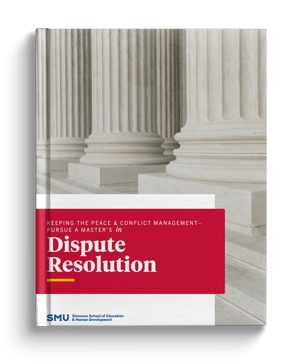Solving the World’s Problems with a Master’s in Conflict Resolution

Pursuing a master’s in conflict resolution is a significant step toward a career dedicated to constructively engaging with conflict and resolving disputes, fostering understanding, and creating positive change. If you are committed to fixing what’s broken in our world and you’re considering an advanced degree, it’s natural to be curious about the careers that could unfold once you complete your studies.
But what is a graduate degree in conflict resolution? And, how can it be the catalyst for developing new skills leading to a career in conflict resolution? Look at the potential careers you can choose and the essential skills you’ll need to succeed in dispute resolution. Are you ready?
What is a Master’s in Conflict Resolution?
A conflict resolution master’s program can provide you with the necessary knowledge and practical skills to experience to effectively manage complex conflicts, discover solutions, and contribute to a broad range of conflicts. In addition to gaining mediation, negotiation, and communication skills, students learn to analyze conflicts from different perspectives and develop strategies for resolution.
In short, you can be prepared to solve issues of all kinds, in a variety of industries, in cultures across the globe. No pressure, right?
Conflict Resolution, Dispute Resolution, or Conflict Management Program
Whether it’s called Conflict Resolution, Dispute Resolution, or Conflict Management, these programs all center on the same core goal: equipping professionals to engage with and resolve conflicts effectively. While titles may vary by university or emphasis (legal, interpersonal, organizational), the foundational skills in negotiation, mediation, and communication are consistent across the board. But not all conflict resolution graduate degrees are the same!
Potential Careers with a Master’s in Dispute Resolution
After getting a master's in conflict resolution, dispute resolution, or conflict management, the options can seem vast—for good reason. The world’s conflicts are vast! With a master’s in conflict resolution, dispute resolution, or conflict management, your career opportunities extend across a wide range of industries. As global challenges grow more complex, the need for skilled professionals has never been greater. The world’s conflicts are vast!
Whether you're interested in the legal field, human resources, or organizational consulting, the skills and mindset you develop in a conflict resolution program are highly sought after and are transferable across a wide range of industries and professions. Conflict can cost organizations serious time, money, and energy to resolve, and many executives are ready to make that investment upfront, not just as issues arise.
To help you better understand the potential paths that you can pursue, let's explore in greater detail just a few of the most common career routes taken by graduates of these programs.
Typical Roles in Dispute Resolution
- Mediator
- Arbitrator
- Conflict Resolution Specialist
- Human Resources Manager
- Ombudsperson
- Restorative Justice Coordinator
- Peacebuilding Analyst
- International Conflict Analyst
- Community Mediation Program Director
- Negotiation Consultant
- Public Safety Professional
- Leadership Consultant
Let’s explore a few of the most typical roles you’ll find in this space.
Mediator
If you are passionate about helping people resolve their differences, becoming a mediator might be the perfect fit for you. In this role, you will facilitate discussions and help parties overcome the awkwardness of disagreement that often accompanies conflict, leading to receptiveness to lessen the conflict. Mediators are crucial in many settings, including legal proceedings, business negotiations, family disputes, and community conflicts.
Executive and Leadership Coach
Becoming an executive and leadership coach can be a rewarding career for those who have a passion for leadership development and mentoring. In this role, you will work with high-level professionals to help them enhance their leadership skills, improve their professional performance, and navigate challenging situations in the workplace. You will provide guidance, support, and feedback to help your clients reach their full potential, achieve their career goals, and make a positive impact in their organizations.
Communication Specialist
As a communication specialist with a background in conflict resolution, you will play a vital role in navigating challenging conversations and disagreements within various industries. Your skill in using effective conflict resolution skills will enable you to engage with conflicts effectively, lead to meaningful conversations, find common interests, and improve communication. Your ability to listen actively and articulate a shared perspective will help you navigate complex relationships and achieve outcomes in different work environments.
Human Resources Partner
In Human Resources (HR), your master’s in conflict resolution allows you to address employee disputes, implement fair policies, and create a positive work environment. By utilizing your conflict resolution skills, you can mediate conflicts, promote understanding among team members, and help create a cohesive and harmonious work environment. Your role as an HR partner will involve resolving conflicts strategically, fostering employee engagement, and upholding fair and inclusive practices within the organization.
Legal Services Professional
In the legal field, conflict resolution skills are essential for negotiating settlements, resolving disputes, and maintaining client relationships. Whether working in law firms or legal departments, your expertise in conflict resolution will be highly valued. By effectively implementing your skills, you can play a pivotal role in achieving positive outcomes for clients and contributing to the smooth functioning of the legal system.
Becoming a Professional Problem Solver
Now that you have a glimpse of the diverse career options available after earning a master’s degree in conflict resolution. It’s essential to explore these careers in dispute resolution further and identify which aligns best with your interests and strengths. At SMU, our dispute resolution faculty can guide you through career exploration and identify roles and industries that align with your interests and strengths.
Whether you find fulfillment in helping individuals navigate conflicts, enjoy shaping organizational dynamics, or have a knack for resolving legal disputes, there's a path for you to become a professional problem solver that aligns with your skills and aspirations.
And let’s set the record straight—no one person can solve the world’s problems. But with the right tools, perspective, and training, you can show up where it matters, help people navigate difficult situations, and be a steady force for resolution and progress.
The Dispute Resolution Program at SMU
If you’re considering a career in conflict resolution, the Master of Arts in Dispute Resolution program at Southern Methodist University can get you there. With a comprehensive curriculum, practical training, experienced faculty, and a strong focus on real-world application, this program can help you develop the skills needed to excel in various conflict resolution roles.
A career in conflict resolution is waiting for you. Learn more about the dispute resolution program at SMU by downloading our free guide: Keeping the Peace & Conflict Management – Pursue a Master's in Dispute Resolution.


